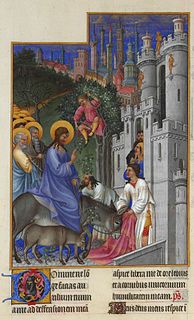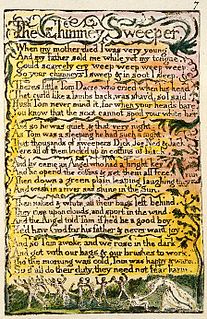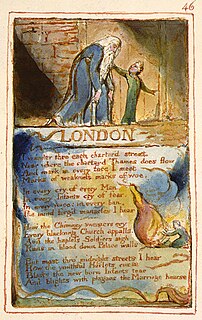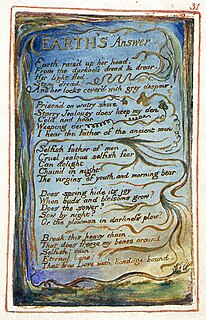
"Holy Thursday" is a poem by William Blake, first published in Songs of Innocence and Experience in 1794. This poem, unlike its companion poem in "Songs of Innocence" (1789), focuses more on society as a whole than on the ceremony held in London.

"Holy Thursday" is a poem by William Blake, first published in Songs of Innocence and Experience in 1794. This poem, unlike its companion poem in "Songs of Innocence" (1789), focuses more on society as a whole than on the ceremony held in London.
The primary objective of this poem is to question social and moral injustice. In the first stanza, Blake contrasts the "rich and fruitful land" with the actions of a "cold and usurous hand" - thereby continuing his questioning of the virtue of a society where resources are abundant but children are still "reduced to misery".
The "Holy Thursday" referred to in the poem is Ascension Thursday, which in the Church of England and other parts of the Anglican Communion, can be used a synonym for the same feast; [2] Thomas Pruen uses the term to refer to Ascension Day in his Illustration of the Liturgy of the Church of England, published in 1820; [3] [4] however use of the term "Holy Thursday" to mean Ascension Day is rare, [5] and the term is more generally applied by most Christian denominations to Maundy Thursday in Holy Week.
On Ascension Day a service was held in St. Paul's Cathedral for the poor children of London's charity schools. Appreciation of the "wise guardians of the poor" thus advertising their charity may not be wholly shared by Blake's "Piper", the supposed narrator of the "Songs of Innocence". In their state of innocence, children should not be regimented; rather, they should be playing blithely on the "echoing green". The children in this poem "assert and preserve their essential innocence not by going to church, but by freely and spontaneously, 'like a mighty wind,' raising to 'heaven the voice of song'". [6]
With his "Holy Thursday" of the "Songs of Experience", Blake's "Bard" clarifies his view of the hypocrisy of formal religion and its claimed acts of charity. He sees the established church's hymns as a sham, suggesting in his second stanza that the sound which would represent the day more accurately would be the "trembling cry" of a poor child.
The poet, as Bard, states that although England may be objectively a "rich and fruitful land", the unfeeling profit-orientated power of authority has designed for the innocent children suffering within it an "eternal winter". The biblical connotations of the rhetorical opening point us towards Blake's assertion that a country whose children live in want cannot be described as truly "rich". With the apparent contradiction of two climatic opposites existing simultaneously within the one geopolitical unit, we are offered a metaphor for England's man-made "two nations".
Blake wrote during the Industrial Revolution, whose pioneers congratulated themselves upon their vigorous increases in output. The poet argues that until increases in production are linked to more equitable distribution, England will always be a land of barren winter.
Is this a holy thing to see,
In a rich and fruitful land,
Babes reducd to misery,
Fed with cold and usurous hand?
Is that trembling cry a song?
Can it be a song of joy?
And so many children poor?
It is a land of poverty!
And their sun does never shine.
And their fields are bleak & bare.
And their ways are fill'd with thorns.
It is eternal winter there.
For where-e'er the sun does shine,
And where-e'er the rain does fall:
Babe can never hunger there,
Nor poverty the mind appall.
Maundy Thursday or Holy Thursday is the day during Holy Week that commemorates the Washing of the Feet (Maundy) and Last Supper of Jesus Christ with the Apostles, as described in the canonical gospels.

Holy Week is the most sacred week in the liturgical year in Christianity. In Eastern Churches, which includes Eastern Orthodox, Eastern Catholic and Eastern Lutheran traditions, Holy Week occurs the week after Lazarus Saturday and starts on the evening of Palm Sunday. In the denominations of the Western Christianity, which includes the Roman Catholicism, Lutheranism, Moravianism, Anglicanism, Methodism and Reformed Christianity, it begins with Palm Sunday and concludes on Easter Sunday. For all Christian traditions it is a moveable observance. In Eastern Rite Churches, Holy Week starts after 40 days of Lent and two transitional days, namely Saturday of Lazarus and Palm Sunday. In the Western Christian Churches, Holy Week falls on the last week of Lent or Sixth Lent Week.

The Paschal Triduum or Easter Triduum, Holy Triduum, or the Three Days, is the period of three days that begins with the liturgy on the evening of Maundy Thursday, reaches its high point in the Easter Vigil, and closes with evening prayer on Easter Sunday. It is a moveable observance recalling the Passion, Crucifixion, Death, burial, and Resurrection of Jesus, as portrayed in the canonical Gospels.

Mary of Egypt was an Egyptian saint, highly venerated as a Desert Mother in the Eastern Orthodox and Coptic Churches. The Roman Catholic Church commemorates her as a patron saint of penitents.

The Feast of the Ascension of Jesus Christ, also called Ascension Day, Ascension Thursday, or sometimes Holy Thursday, commemorates the Christian belief of the bodily Ascension of Jesus into heaven. It is one of the ecumenical feasts of Christian churches, ranking with the feasts of the Passion, of Easter, and Pentecost. Following the account of Acts 1:3 that the risen Jesus appeared for 40 days prior to his Ascension, Ascension Day is traditionally celebrated on a Thursday, the fortieth day of Easter; although some Christian denominations have moved the observance to the following Sunday. In the Catholic Church in the United States, the day of observance varies by ecclesiastical province.

Eastertide or Paschaltide is a festal season in the liturgical year of Christianity that focuses on celebrating the Resurrection of Jesus Christ. It begins on Easter Sunday, which initiates Easter Week in Western Christianity, and Bright Week in Eastern Christianity. There are several Eastertide customs across the Christian world, including sunrise services, exclaiming the Paschal greeting, clipping the church, and decorating Easter eggs, a symbol of the empty tomb.

Christian liturgy is a pattern for worship used by a Christian congregation or denomination on a regular basis. The term liturgy comes from Greek and means "public work".

"The Chimney Sweeper" is the title of a poem by William Blake, published in two parts in Songs of Innocence in 1789 and Songs of Experience in 1794. The poem "The Chimney Sweeper" is set against the dark background of child labour that was prominent in England in the late 18th and 19th centuries. At the age of four and five, boys were sold to clean chimneys, due to their small size. These children were oppressed and had a diminutive existence that was socially accepted at the time. Children in this field of work were often unfed and poorly clothed. In most cases, these children died from either falling through the chimneys or from lung damage and other horrible diseases from breathing in the soot. In the earlier poem, a young chimney sweeper recounts a dream by one of his fellows, in which an angel rescues the boys from coffins and takes them to a sunny meadow; in the later poem, an apparently adult speaker encounters a child chimney sweeper abandoned in the snow while his parents are at church or possibly even suffered death where church is referring to being with God.

Infant communion, also known as paedocommunion, refers to the practice of giving the Eucharist, often in the form of consecrated wine mingled with consecrated bread, to young children. This practice is standard in the Eastern Orthodox Church and the Eastern Catholic Churches; here, communion is given at the Divine Liturgy to all baptized and chrismated church members regardless of age. Infant communion is less common in most other Christian denominations, including the Latin Rite of the Catholic Church.

"London" is a poem by William Blake, published in Songs of Experience in 1794. It is one of the few poems in Songs of Experience that does not have a corresponding poem in Songs of Innocence. Blake lived in London so writes of it as a resident rather than a visitor. The poems reference the "Two Contrary States of the Human Soul". The "Songs of Innocence" section contains poems which reference love, childhood and nature. Critics have suggested that the poems illustrate the effects of modernity on people and nature, through the discussion of dangerous industrial conditions, child labour, prostitution and poverty.

"The Blossom" is a poem by William Blake, published in Songs of Innocence in 1789.

Holy Thursday is a poem by William Blake, from his 1789 book of poems Songs of Innocence.

The Mass of the Lord's Supper, also known as A Service of Worship for Maundy Thursday, is a Holy Week service celebrated on the evening of Maundy Thursday. It inaugurates the Easter Triduum, and commemorates the Last Supper of Jesus with his disciples, more explicitly than other celebrations of the Mass.
Principal Feasts are a type of observance in some churches of the Anglican Communion, including the Church of England, the Episcopal Church, and the Anglican Church of Canada. All Principal Feasts are also Principal Holy Days, sharing equal status with those Principal Holy Days which are not Principal Feasts. They are considered to be the most significant type of observance, the others being Festivals, Lesser Festivals, and Commemorations. As with all Principal Holy Days, their observance is obligatory. The Anglican Principal Feasts and Principal Holy Days are somewhat comparable to Roman Catholic Solemnities and Holy days of obligation.

Earth's Answer is a poem by William Blake within his larger collection called Songs of Innocence and of Experience. It is the response to the previous poem in The Songs of Experience-- Introduction . In the Introduction, the bard asks the Earth to wake up and claim ownership. In this poem, the feminine Earth responds.

The Little Vagabond is a 1794 poem by William Blake in his collection Songs of Innocence and of Experience. His collection, Songs of Innocence, was originally published alone, in 1789. The scholar Robert Gleckner says that the poem is a form of transformation of the boy in the poem "The School Boy", from Songs of Innocence.

The Mental Traveller is a poem by William Blake. It is part of a collection of unpublished works called The Pickering Manuscript and was written in a manner that suggests the poem was to be read directly from the collection.
Holy Thursday or Maundy Thursday is the traditional observance day of the Maundy and Last Supper of Jesus, i.e., the Thursday falling before Easter.

Introduction to the Songs of Experience is a poem written by the English poet William Blake. It was etched and published as part of his collection Songs of Innocence and of Experience in 1794.

"The School Boy" is a 1789 poem by William Blake and published as a part of his poetry collection entitled Songs of Experience. These poems were later added with Blake's Songs of Innocence to create the entire collection entitled "Songs of Innocence and of Experience Shewing the Two Contrary States of the Human Soul". This collection included poems such as "The Tyger", "The Little Boy Lost", "Infant Joy" and "The Shepherd". These poems are illustrated with colorful artwork created by Blake first in 1789. The first printing in 1789 consisted of sixteen copies. None of the copies of Songs of Innocence are exactly alike as some of them are incomplete or were colored in posthumously "in imitation of" other copies.
What do people do on Ascension Day? Anglican: Ascension Day is also known as Holy Thursday in some Anglican Churches.
Ascension Day. This, called also Holy Thursday, is ten days before Whitsuntide.
The day is sometimes called Holy Thursday. Ascension Day is a 'holy day of obligation' for all Roman Catholics which means that they are expected to attend Mass on this day. Many Anglican churches also have a special Holy Communion to celebrate the reception of Jesus into heaven by God.
| Wikisource has original text related to this article: |